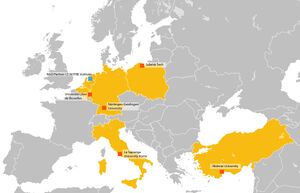Main Page: Difference between revisions
No edit summary |
|||
| Line 5: | Line 5: | ||
'''TELOS''' stands for: '''T'''owards a '''E'''uropean '''L'''andscape Ec'''o'''nomy for a '''S'''ustainable Urban Development | '''TELOS''' stands for: '''T'''owards a '''E'''uropean '''L'''andscape Ec'''o'''nomy for a '''S'''ustainable Urban Development | ||
== | == Why TELOS? == | ||
Our project brings five European metropolitan areas together to address this spatial and educationalchallenge in a new way: we link Rome, Stuttgart, Brussels, Gdansk and Antalya. | |||
TELOS contributes to a large-scale transnational educational transformation and empowers a new generation of visionary professionals, decision-makers and urbanites, to address sustainability challenges through problem-solving approaches that integrate systems thinking, anticipatory strategic competences, real life scenarios and insights, and interpersonal skills. | |||
TELOS aims to build ‘knowledge and action bridges’ between the seemingly competing systems of ecology and economy, as they appear in our everyday urban environment. The target groups of the TELOS project are primarily university staff and students from the following subject domains: urban planning, landscape planning, architecture and landscape architecture, agriculture, regional development, economics, business administration and real estate. Related stakeholder groups are equitable finance players, real estate developers and related industries, NGOs, municipalities, and the wider public, aiming to break down barriers and foster collaboration while encouraging knowledge exchange at all levels | |||
Revision as of 06:57, 23 September 2022

TELOS stands for: Towards a European Landscape Economy for a Sustainable Urban Development
Why TELOS?
Our project brings five European metropolitan areas together to address this spatial and educationalchallenge in a new way: we link Rome, Stuttgart, Brussels, Gdansk and Antalya.
TELOS contributes to a large-scale transnational educational transformation and empowers a new generation of visionary professionals, decision-makers and urbanites, to address sustainability challenges through problem-solving approaches that integrate systems thinking, anticipatory strategic competences, real life scenarios and insights, and interpersonal skills.
TELOS aims to build ‘knowledge and action bridges’ between the seemingly competing systems of ecology and economy, as they appear in our everyday urban environment. The target groups of the TELOS project are primarily university staff and students from the following subject domains: urban planning, landscape planning, architecture and landscape architecture, agriculture, regional development, economics, business administration and real estate. Related stakeholder groups are equitable finance players, real estate developers and related industries, NGOs, municipalities, and the wider public, aiming to break down barriers and foster collaboration while encouraging knowledge exchange at all levels

